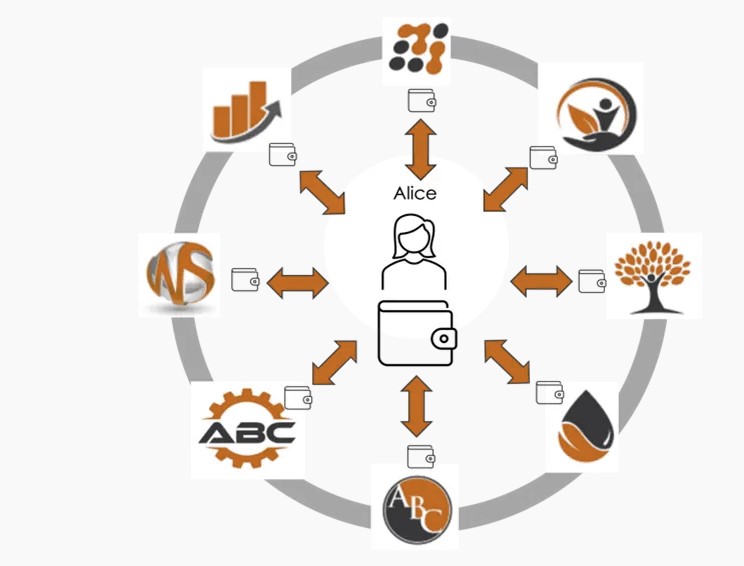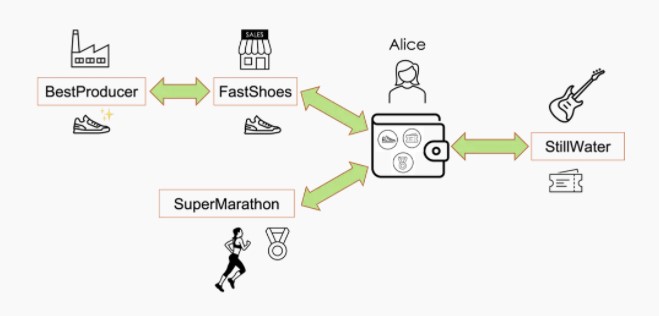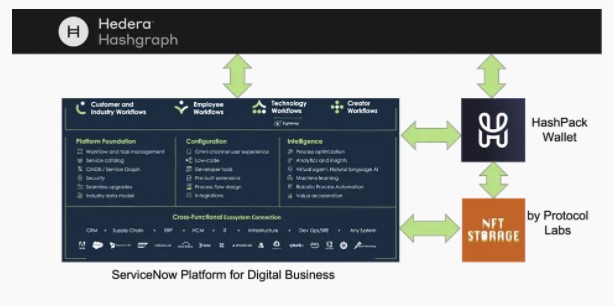Here, we will tell you how Hedera and ServiceNow help organizations create and distribute their tokens. Customer engagement is one of the most common terms in the marketing world today, yet it is still commonly misunderstood.
A customer engaged with your company is one that appreciates your brand enough to keep coming back for more, or even recommend your product to friends and family. The key to this type of relationship is to provide value at every interaction: from the first phone call, through shipping and delivery or service issues, or even buying from an online retailer like Amazon.
ServiceNow is an enterprise IT platform that facilitates cloud-based automation and management. It delivers a flexible, scalable, and secure framework that supports service delivery, workspaces, and apps. The platform allows customers to capture business process information from disparate systems using intelligent agents. It automates common tasks through workflow automation services such as rules engines and business event processing.
Connecting with customers on a more personal and intimate level is a necessity for brands. Customers expect to receive products and services that are tailored to their unique stories and needs. According to a McKinsey report, “Next in Personalization 2021 Report,” 71% of customers expect personalization, and 76% are frustrated when they don’t get it. In today’s business environment, connecting with customers on a personal level is no longer optional. Organizations are expected to celebrate milestones by 61% of customers.
Personalization of products and services can lead to significant rewards for a company. In the same study, 40% of the revenue of the fastest-growing companies is derived from personalization.
Even though loyalty programs are widespread, they aren’t as effective as they once were. There is a huge lack of loyalty programs, with fewer than 50% of Americans who are eligible for them. Many customers complain that they cannot manage their loyalty points across multiple sites, and they do not collect rewards earned through classic loyalty programs.
Customers are experimenting with new shopping behaviors as a result of the pandemic, with 70% of customers undergoing changes in their shopping habits as a result of the pandemic. New ways of engaging with customers and keeping them loyal will enable disruptive competitors to capture the market.
ServiceNow Token Economy
The Blockchain Research Institute describes tokens as valuable, representative, distinct, digital, and authentic assets. We should emphasize that tokens are not cryptocurrencies. Essentially, tokens are records of ownership on a distributed ledger and represent human activities.
Although their origins can be traced back to gaming, tokens are on the verge of disrupting brand-customer relationships.
Token reinforcement has been studied by psychologists and behavioral scientists for over a century. Brands like Nike, Tiffany, Gucci, Dolce & Gabbana, and Louis Vuitton are among those launching their own tokens today, as tokens are changing consumer behavior.
There is a growing body of knowledge about tokens. The term non-fungible token (NFT) is used in any introduction to blockchain technology. A fungible token, like loyalty points, is an item that can be exchanged for another. Unlike fungible tokens, non-fungible tokens are unique and easily recognizable, such as serial numbers on products.

In addition to fungibility, tokens can be classified in a variety of ways. Using a few basic types of tokens (fungible/non-fungible, fractional/whole, hybrid, singleton) and a variety of behaviors and properties, InterWork Alliance’s Token Taxonomy Framework (TTF) offers a rich classification of tokens.
One of the most significant concepts of tokenization is the wallet, which reaches beyond tokens. The keys to an organization’s or customer’s identity are stored in a wallet. Enterprise wallets can be owned by organizations and customer wallets can be owned by individuals. Customers’ wallets allow them to own assets by allowing them to sign with the keys in their wallets. Enterprise wallets protect the keys of the organization on which employees have signature rights.
A customer wallet ensures customer centricity, as the customer will own and control all token-related activities from a single point of control. Token-based business models rely on the interaction between customers’ wallets and enterprise wallets.
The customer acts as the orchestrator of all interactions through the distributed ledger, which makes tokens an excellent solution for integration challenges.
ServiceNow Use Case Scenario
The purpose of this use case is to demonstrate how ServiceNow facilitates the creation and distribution of tokens for organizations. Additionally, we will see how ServiceNow can offer both enterprise wallets so that the organization can manage token lifecycles and integrate with customers’ wallets to present tokens.
As we see in the use case, Alice, a user of FastShoes, has bought a pair of running shoes. Alice can redeem an NFT from the FastShoes Customer Service portal once she has purchased her product. Alice uses the digital twin to validate the authenticity and provenance of the product by knowing its manufacturer and its sustainability and labor standards.

As a member of FastShoes, Alice will have the opportunity to take part in a variety of exciting challenges. In the event she completes the SuperMarathon within the first 500 positions, she will be awarded two tickets to the concert of her favorite rock band, Stillwater. She will also meet the band on stage. It is a challenge Alice accepts. As a result of her rigorous training, she came in 250th place in the marathon. In addition to her NFT, the SuperMarathon organization also distributes a certificate of achievement, which Alice proudly keeps in her wallet.
She connects her wallet to the Stillwater website (also implemented with ServiceNow technology) in order to redeem the two tickets from Stillwater for her and Bob. It is possible for her to cryptographically present the NFT from FastShoes, which represents the product, and the NFT from SuperMarathon, which represents her accomplishment. Then Stillwater can recognize her and issue fungible tokens for the two tickets. We must recognize that tokens represent both inputs and outputs in the journey we are describing.
It is relevant to note that the specific use case described can be generalized to other organizations and industries, where tokens may represent other products, achievements, accreditations, and affiliations.
In this use case, ServiceNow Token Workflows showcase some of its most significant capabilities for managing customer journeys and establishing a personal relationship between a brand and its customers:
- Ensure that product history and provenance are trustworthyEstablish a bi-directional relationship between brands and customers
- Engage your customers at moments that matter to build loyalty and engagement
- Take advantage of personalized benefits, discounts, and limited editions creating more meaningful moments for customers
How it works
You can watch the demo here:
All enterprise participants are using the same ServiceNow instance in this demo:
- BestProducer, the manufacturer,
- A brand called FastShoes,
- SuperMarathon, the marathon organizer,
- Stillwater’s ticket reseller
Through the ServiceNow Hedera Connector and HashConnect libraries, the ServiceNow instance is integrated with the Hedera DLT and the HashPack wallet.
IPFS (InterPlanetary FileSystem) is also used to immutably store the NFTs’ payloads.

Even though we prefer to have all participants in the same ServiceNow environment, it’s pertinent to recognize that each enterprise participant may have its own instance of ServiceNow. This will not disrupt the demo.
Using the ServiceNow Hedera Connector API, parties can participate in the business process without owning a ServiceNow instance.
Takeaways
Customers can interact with brands more effectively by using tokens, which represent a new avenue for engagement and loyalty.
Through the Now Platform, organizations can adopt the token paradigm across a wide range of industries and products.
ServiceNow is an ideal environment for managing tokens at scale because the Now Platform orchestrates tokens consistently through workflows.
As part of managing tokens, it is imperative to make sure they don’t live in isolation but are integrated into existing business processes, which are already governed by ServiceNow.
Multi-organization token workflows enable brands to create collaborative business models that create customer value together. Collaboration can involve enterprises, sports teams, associations, public figures, artists, and influencers.
As a result of a cohesive business model centered around the customer, tokens connect different parts of the customer journey with brands.
Via this site

